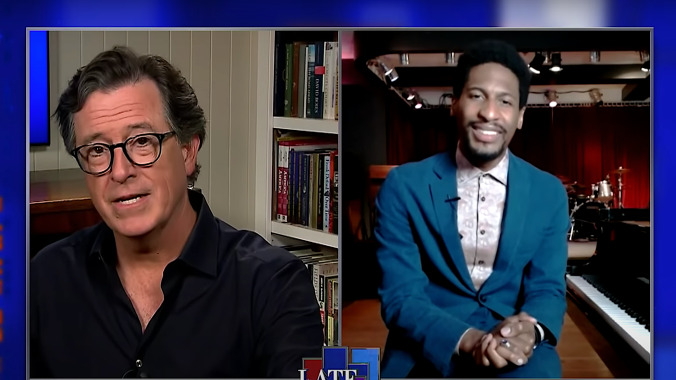Stephen Colbert and Jon Batiste examine John Lewis' legacy: "He's inviting us to our greatness"

John Lewis died at the age of 80 last week, depriving America of a civil rights hero (and plain hero) just when it needs such inspirational figures most. But The Late Show’s host Stephen Colbert and very socially distanced bandleader Jon Batiste (back home in New Orleans) spent a thoughtful and heartfelt nine minutes bucking themselves—and America—up by reminding us that aspirational figures like Lewis continue to inspire us after they’re gone.
Not that there are many figures in American history more aspirational than John Lewis. As Colbert put it after running down a partial list of the late Congressman’s lifetime of achievements (Freedom Rider, frontline activist for civil rights, 30-years in Congress, 23-year-old speaker at the March On Washington, for crying out loud), “He had already done more for the country at 23 than most people do in a lifetime.” Still, as Colbert illustrated with clips of “friend of the show” Lewis’ appearances on The Late Show over the years, Lewis was hardly a remote, idealized monument to greatness, but instead a living, breathing, sometimes crowd-surfing embodiment of it. (Colbert reacted to the time in 2016 where the adoring Ed Sullivan Theater audience passed the then 76-year-old Lewis over their heads like Peter Gabriel, musing over the before-times, when “it was okay for a crowd of strangers to touch and old man.”)
Bringing in Batiste (who had a memorable barbershop segment listening to Lewis talk about forgiving the now-elderly white man who savagely beat Freedom Rider Lewis for using a “whites-only” waiting room), Colbert feelingly worked through the complicated feelings surrounding the absence of someone whose work and example feels so present, and needed. “We tend to carve our heroes in marble and forget the other sides of them,” said Colbert, smiling at memories of graphic novel author Lewis cosplaying as himself and leading a march of young Comic-Con devotees around the convention hall. Said Batiste of Lewis’ continued presence after his death, “He exists as a truly righteous person, and concluding, “He’s inviting us to our greatness.”
Colbert echoed that, noting that Lewis, true to himself even after he’s been gone, challenges us to live up not just to his example, but to the daily responsibility of surpassing our—and our ever-struggling country’s—limitations. With the sincerity and earnestness born out of a somber but affectionate wake between friends, Colbert said that we tend to use the safely marbleized example of our heroes as an excuse not to try to emulate what made them great. John Lewis’ lifetime of public heroism and service, according to Colbert, “is an accusation that you are not standing tall enough.”
To that end: Looking for ways to advocate for Black lives? Check out this list of resources by our sister site Lifehacker for ways to get involved. One good place to start honoring John Lewis: Pressuring Mitch McConnell to pass the Voting Rights Advancement Act, which has been gathering dust on his overcrowded desk.